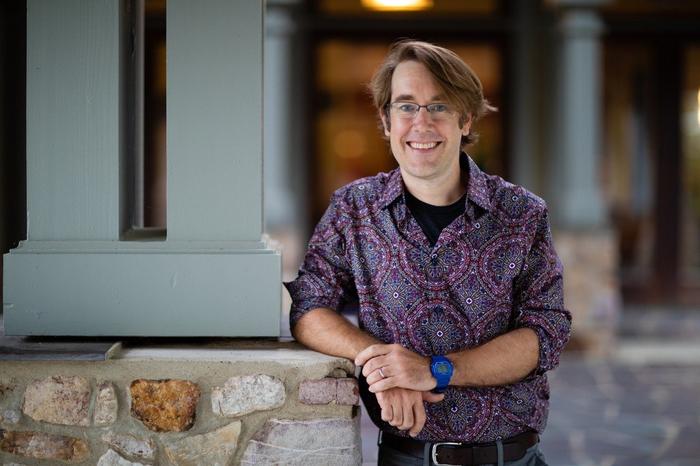
image: Dan Williams, assistant professor of computer science, will spend the next five years exploring ways to modernize the foundation of Linux operating systems under the auspices of a $600,000 National Science Foundation CAREER award.
visualization Moreover
Credit: Virginia Tech
Every night, untold numbers of devices around the world update their operating systems (OS), and everyday users connect expecting fast and secure connections and services to keep their increasingly online lives on the go. But as artificial intelligence and other more complex systems come into play, the foundations of all of them are shaky.
Every aspect of society, from government and industry to education and entertainment, relies on devices with stable operating systems. And every operating system is based on a collection of millions of lines of code that support its functions. That vast and growing collection of code is collectively called “the kernel,” and like the seed it’s named after, it’s essential to financial markets, business and industry, education, government, and national security.
“If it stops working, nothing will work. The world would basically shut down,” said Dan Williams, an assistant professor of computer science in the College of Engineering.
The problem? The kernel is written in an older coding language called C and is constantly getting bigger and more complex to serve more devices and applications. Meanwhile, fewer computer scientists are interested in working on it.
“It’s hard to interest students in a tangle of code written in C when there’s so much going on with artificial intelligence and other innovations. But all these innovations are based on the kernel. We need more people working on it,” Williams said.
To accomplish this goal, Williams was recently awarded a five-year, $600,000 National Science Foundation (NSF) Faculty Early Career Development (CAREER) award to explore new ways to stabilize and upgrade the existing Linux kernel, one of the most widely used kernels globally. . The grant will also support the education of the next generation of computer scientists in the skills needed to work with the kernel.
“Dan Williams’ commitment to innovative work on this critical global challenge is emblematic of how our faculty and students lead the way,” said Cal Ribbens, head of the Department of Computer Science. “I believe the work done by his team will encourage current and future students and faculty to address deep technical issues, such as a stable and robust operating system kernel.”
It crashes and fixes
Part of the operating system of every server, computer, and network device, the kernel acts like an air traffic controller, making sure that cloud-based software and services work without crashing into each other. It sits between the hardware, software, and cloud services that users interact with, handling all communications between them. When a user touches an object on the screen or types on a keypad, it’s the kernel that ensures those commands are followed.
“When a computer crashes, it often indicates a kernel error,” Williams said. “It’s working to fix something that went wrong. If it fails to fix it, the computer crashes, sometimes taking important data with it.
All those nightly updates your operating system is for you? Williams said many of these are fixes to bugs that have surfaced in the kernel. But updates are bandages. Bugs, viruses, memory shortages, and other problems can slow it down and make your system vulnerable to attacks, such as ransomware.
Globally, computing relies on just a handful of kernels, Williams said. A wide variety of devices, including Google, Amazon, and Android, run on the Linux kernel. Regardless of which operating system a system uses, all kernels suffer from similar weaknesses, she said.
According to an analysis conducted in 2021, there are more than 28.8 million lines of code in the Linux operating system kernel.
“It’s so complex that no one can figure out all of its functions,” Williams said. “And in some ways it is mysterious even for those who study it. It’s a black box.
Williams spent 10 years at IBM Research testing new ways to fix or replace the Linux kernel. But so many industries and critical government systems rely on it, changes can cause unforeseen problems. And the stakes are so high that it’s functionally impossible to wholesale replace it with a new one.
“The kernel is in many ways too big to fail. And this runaway kernel complexity has become a significant barrier to entry for students and professionals to learn or innovate at the kernel level,” Williams said. essential cores on which our society depends”.
A new approach
Two years ago, Williams came to Virginia Tech with an idea for a new approach that could help stabilize the kernel and could also help get more students interested in studying it. As part of this NSF CAREER grant, his research team will pilot the construction of a new open source extension framework that would target existing weaknesses in the kernel.
The idea is to build these sections of code in the more flexible and robust Rust language and install them as a bypass to problematic sections of the existing kernel. If the approach is successful, adding more extensions could, over time, replace the existing kernel with a better one, without breaking existing applications and users.
Williams said his lab will be working on creating a new model of the kernel that undergraduate and graduate students can experiment with. It could be used in new computer science classes and educational “boot camps”. Since anyone can use the open source code developed by the team, it could stimulate wider interest and experimentation.
The work could also prepare students for industry internship opportunities to work on existing kernels in real-world situations.
“Without exposure to real systems in use today, the number of students qualified and interested in operating system kernels will fall below what they should be for such critically important software as the operating system kernel,” he said Williams. “Our efforts on this project can help us achieve our educational goals, and the open source nature of our work will allow those already working in this space to engage in innovative thinking and approaches around operating system kernels.”
#NSF #CAREER #award #invests #future #stable #computing
Image Source : www.eurekalert.org
